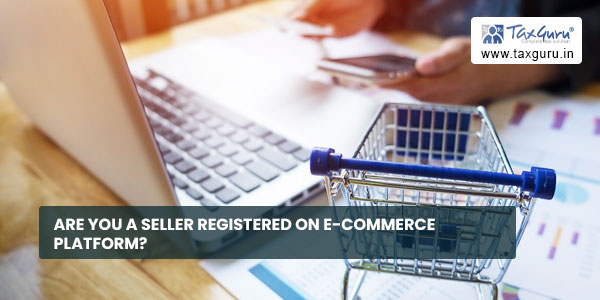HERE ARE SOME THINGS YOU MUST KNOW….
E-commerce has transformed the way business is done in India. Much of the growth for the industry has been triggered by an increase in internet and smartphone penetration. Accordingly, there is similar growth in sellers over E-commerce portals.
In this article, we are depicting some of the key parameters which can help E-commerce sellers or anyone planning to start their E-commerce business to assess / step-up their compliance processes:

♦ Registration under GST:
GST Registration is mandatory for E-commerce sellers to get registered on Ecom portal. E-commerce sellers are required to get registered under GST even if their turnover is less than the threshold limit of Rs. 40/20/10 lakhs.
♦ TCS under GST & TDS under Income Tax:
TCS under GST:
The E-commerce sellers supplying goods and/or services through e-commerce operators will receive payment after deduction of TCS @ 1% on Net Value of Taxable Outward Supplies (1% IGST for Interstate sales & 0.5% CGST & 0.5% SGST for Intrastate sales).
TCS will not be an expense for seller but an asset which can be set-off against their GST tax liability. TCS can be claimed post filing the TCS returns from GST portal which gets credited to GST cash ledger.
TDS under Income Tax Act:
TDS: – As per Section 194-O of Income Tax Act, every E-commerce operator (e.g., Amazon, Flipkart, etc.) is bound to deduct 1 % TDS of the gross taxable outward supplies of the E-commerce seller while settling amount to E-commerce seller. (Appliable only if, gross sales exceed Rs. 5,00,000 in the financial year by a resident Individual or HUF)
Note: If the deductee does not provide the PAN or Aadhaar Card, then TDS shall be deducted at the rate of 5% of the gross sales amount.
♦ Multiple Registrations & APOB (Additional Place of Business)
Being in E-commerce business, in case sellers plan to stock & sell the goods from multiple states for prompt delivery, they are required to obtain multiple GSTNs or add APOB(s) with warehousing models of E-commerce Operators.
With this, all the compliances are required to be done for all GSTNs & turnover needs to be reconciled based on PAN.
♦ Returns under GST
The E-commerce seller should declare his outward supplies in GSTR1 (B2B and B2C) matching with TCS returns (GSTR 8) filed by E-Commerce Operator. The said return should also include other than E-commerce sales, if any.
Post filing GSTR 1, liability needs to be settled by filing GSTR 3B on reconciliation with GSTR 2B. (For additional info regarding to this, you can refer to our previous article – Struggling with GSTR 2B Reconciliation).
The liability can be settled with available cash balance in GST cash ledger as claimed by filing TDS/TCS return under GST (refer point 2)
♦ Invoicing & Inventory Movement
Every supplier shall issue GST compliant invoice for each supply. In case of sales through E-commerce Operators (ECO), the ECO generates the invoices on behalf of the seller & the same needs to be reported while filing the returns.
Additionally, if the e-commerce supplier is subject to e-invoicing rules, either the supplier or ECO must generate the IRN for B2B invoices from the Invoice registration portal. (For additional info regarding to this, you can refer to our previous article – E-Invoicing). The same invoicing process is required to follow in case of e-way bill for Inventory Movement from one state to another.

♦ Settlement Process
E-commerce operators settle the amount received by them in following manner:
| Particulars | Rs. | Remarks/Check Points |
| Gross Sales | 100 | Sales done from your account |
| (-) Deduction for Fees (Closing Fee, Fulfilment, etc.) | -27* | E-Commerce Operator shares invoices |
| (-) TDS under Income Tax Act | -1 | Can be verified through Form 26AS |
| (-) TCS under GST | -1 | Can be verified through GST Portal |
| (+/-) Retentions | 0** | |
| Balance to be settled | 71 | Can be verified through bank statements |
*If provisions of TDS under Income Tax are appliable to supplier, supplier is required to deduct TDS for such charges & claim refund from ECO by submitting form 16A.
** For simplicity, we have taken retentions as Zero.
Authors:
CA Prashant Taparia | Partner | Email: prashant.taparia@masd.co.in |
Yash Shah | Associate Consultant | Email: yash.shah@masd.co.in
Mihir Jain | Associate Consultant | Email: mihir.jain@masd.co.in






Hi. Can ecommerce operator generate einvoice on our behalf